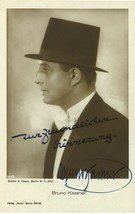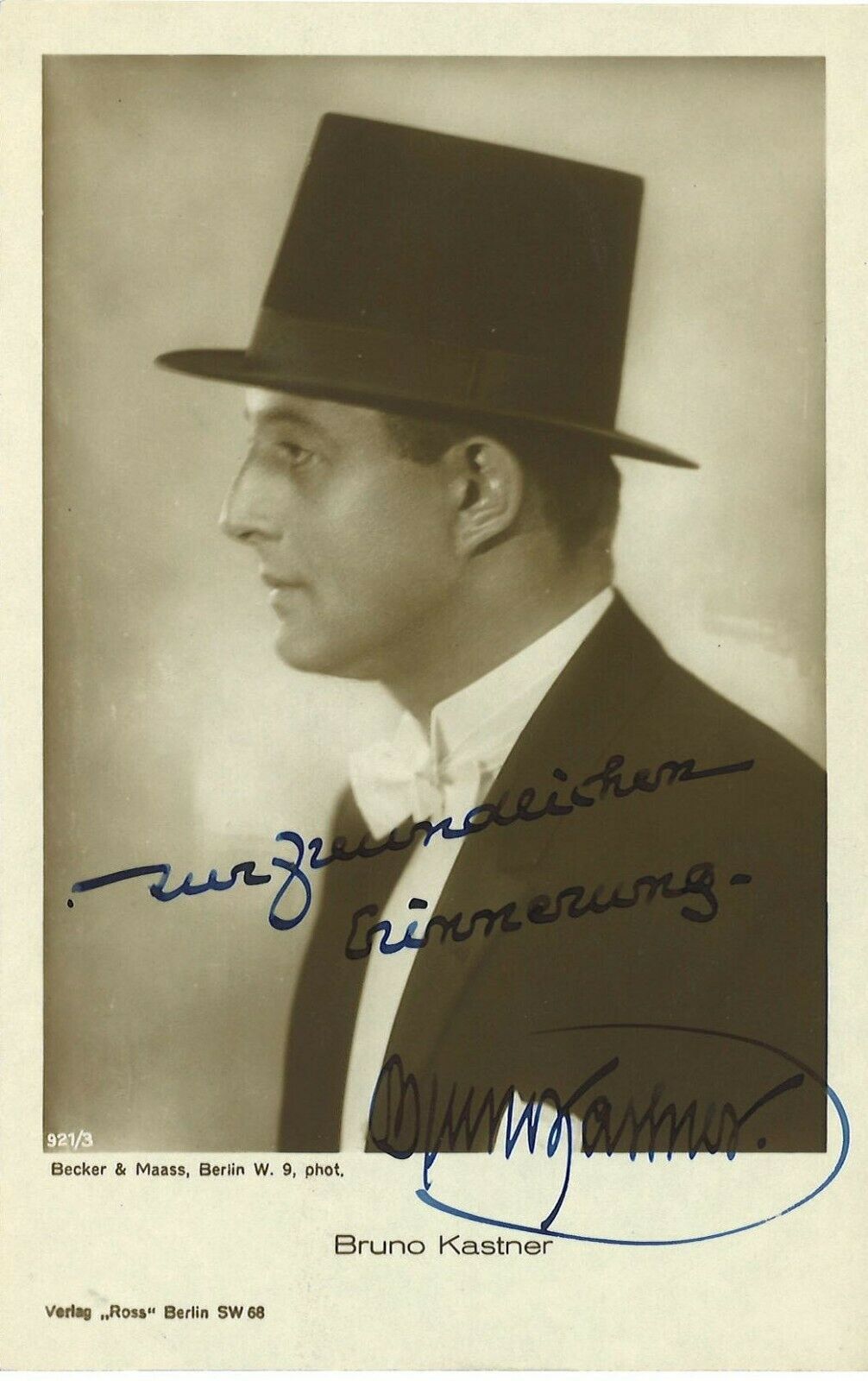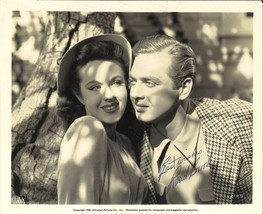Bruno Kastner (1926) Orig German Silent Film and 50 similar items
BRUNO KASTNER (1926) Orig German Silent Film Postcard SIGNED BY BRUNO KASTNER
$125.00
View full item details »
Shipping options
Offer policy
OBO - Seller accepts offers on this item.
Details
Return policy
Refunds available: See booth/item description for details
Details
Purchase protection
Payment options
PayPal accepted
PayPal Credit accepted
Venmo accepted
PayPal, MasterCard, Visa, Discover, and American Express accepted
Maestro accepted
Amazon Pay accepted
Nuvei accepted
View full item details »
Shipping options
Offer policy
OBO - Seller accepts offers on this item.
Details
Return policy
Refunds available: See booth/item description for details
Details
Purchase protection
Payment options
PayPal accepted
PayPal Credit accepted
Venmo accepted
PayPal, MasterCard, Visa, Discover, and American Express accepted
Maestro accepted
Amazon Pay accepted
Nuvei accepted
Item traits
| Category: | |
|---|---|
| Quantity Available: |
Only one in stock, order soon |
| Condition: |
Unspecified by seller, may be new. |
| Country/Region of Manufacture: |
Germany |
| Size: |
3.5 x 5.25 inches |
| Industry: |
Movies |
| Original/Reproduction: |
Original |
| Signed by: |
Bruno Kastner |
| Autograph Authentication: |
Not Authenticated |
| Movie: |
Publicity photograph |
| Modification Description: |
Signed in black ink by silent film actor Bruno Kastner. |
| Item Number: |
PC-KASTNER-01 |
| Modified Item: |
Yes |
| Object Type: |
Postcard |
Listing details
| Seller policies: | |
|---|---|
| Shipping discount: |
No combined shipping offered |
| Posted for sale: |
More than a week ago |
| Item number: |
732101857 |
Item description
Vintage original 3.5 x 5.25 in. German postcard depicting the handsome German silent film actor, screenwriter, and producer , BRUNO KASTNER. He is depicted in a close publicity shot in profile wearing a tuxedo with a black top hat. This postcard was signed in black ink by Bruno Kastner in, we believe, 1926 (see additional details below), the year in which he appeared in six silent films in Germany. Printed by the renowned Ross-Verlag company of Berlin, Germany, this vintage original "country of origin" postcard is unused in very fine condition with a small diagonal mark (not a crease) on each corner from where it was inserted into the albums that are referenced below. There are no tears, stains, or other flaws.
Provenance: Approximately 8 years ago, we purchased a collection of two albums of vintage original German postcards from a rare book dealer at an antiquarian book fair in Pasadena, California (see photos). Approximately half of the postcards were signed by the respective personalities and the ones that were dated by the actors are all dated "1926." We were informed by the dealer that these photographs came from a film collector in Germany who acquired the postcards at the time they were issued and then had them signed by the respective actors when he met them in person. We are now pleased to make these vintage original postcards available to other collectors.
Bruno
Kastner (January 1890 – June 3, 1932) was a German stage
and film actor, screenwriter, and film producer whose
career was most prominent in the 1910’s and 1920’s during the silent film era.
He was one of the most popular leading men in German films during his career's
peak in the 1920’s. During World War I, Kastner avoided military
service, assessed as unfit for service due to his prior injury while serving
before the war's outbreak. Discovered by Danish film actress Asta
Nielsen, he made his film debut opposite her in the 1914 Urban Gad-directed
comedy short, Engelein (Little Angel), with Fred Immler and Hanns
Kräly. He followed the success of this film with the sequel, Engeleins Hochzeit (Little Angel's Wedding) in 1916. In the
interim, Kastner quickly became a matinee idol in Germany, especially popular
with female fans. The German press commented on Kastner's rise to stardom and
how vexed postmen were at having to transport love letters from fans to Kastner
in laundry baskets. Kastner cemented his romantic image by appearing as
the ardent suitor to popular actress Dorrit Weixler in a number of
films of the era. Male filmgoers were less fond of Kastner's image of a
handsome dandy and gave him the nickname "Kleiderbügel"
("coat hanger") - a reference to his slim build and fashionable
wardrobe.
Although
he didn't carry much clout with many male filmgoers, his popularity with female
fans grew momentum. In 1921, Kastner was voted "The Best German
Actor" in a magazine poll and he began appearing that year in a film
serial called Der Silberkönig (The Silver King) opposite leading
lady Ossi Oswalda. The following year, he founded his own film company.
Other popular films of the era included roles in Fritz Lang's Hilde Warren und der Tod (1917), Erik
Lund's Das Herz des Casanova (1919)
and Georg Jacoby's Das Paradies im
Schnee (1924). Kastner wrote the screenplays for four films that he
would produce and star in: Nur ein
Diener, Das Herz des Casanova, Der letzte Sonnensohn and Der Weltmeister, all directed by Erik
Lund and released in 1919.
Kastner's
career was almost cut short in 1924 when he was involved in a serious
motorcycle accident in Lugano, Switzerland, which left him with permanent
pain. He never fully recovered, but after a year of rest and recuperation, he
returned to the screen in 1925. By the late 1920’s, his career began to falter.
No longer able to play the young, seductive bon vivant type which had
made him famous, his roles in films grew smaller, although he still had a
measure of success in such films as Karl Grune's 1926 drama, Die Brüder Schellenberg, with Conrad
Veidt, Lil Dagover, and Liane Haid, and the Jacob
Fleck and Luise Fleck-directed Der Orlow, with Iván Petrovich and Hans Junkermann in
1927.
The
onset of sound films proved disastrous to Kastner's career in 1930
upon the release of his first talkie titled Das Land des Lächelns (The
Land of Smiles), when filmgoers discovered that he stammered. He would
only make one more film, 1930's unsuccessful Tingel-Tangel. After failing to garner any more film roles because
of his speech impediment, he tried to revive his career by touring German
theatres and permitting female members of the audience to get onstage and have
their photograph taken with their past idol. Kastner suffered from
depression after his rapid career decline and, after two years of struggling to
regain his public popularity, he rented a hotel room in Bad Kreuznach and
committed suicide by hanging himself in June 1932. He was 42.
Ross-Verlag in Berlin was a German
publishing house specialized in photographs and photo postcards of artists. The
owner of the company was Heinrich Ross (b. 10 August 1870; d. after 1954 as
emigrant in the USA).
|
Why are we showing these items?
Booth
SilentCinema's Booth |

|

-
Refine your browsing experience
We can show you more items that are exactly like the original item, or we can show you items that are similar in spirit. By default we show you a mix.
This item has been added to your cart
 BRUNO KASTNER (1926) Orig German Silent Film Postcard SIGNED BY BRUNO KASTNER added to cart.
Only one available in stock
BRUNO KASTNER (1926) Orig German Silent Film Postcard SIGNED BY BRUNO KASTNER added to cart.
Only one available in stock
View Cart or continue shopping.
 Please wait while we finish adding this item to your cart.
Please wait while we finish adding this item to your cart.
Get an item reminder
We'll email you a link to your item now and follow up with a single reminder (if you'd like one). That's it! No spam, no hassle.
Already have an account?
Log in and add this item to your wish list.






























































